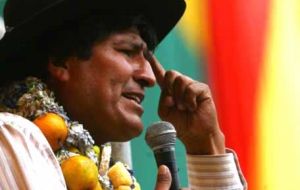MercoPress. South Atlantic News Agency
Political agreement in Bolivia ends Morales hunger-strike
 President Evo Morales
President Evo Morales President Evo Morales has ended a five days long hunger strike after Bolivia's congress approved a new electoral law that grants more voting power to his electoral turf and allows him to run for a second term five-year term next December.
The legislation, approved after nine hours of intense debate, sets rules for December 6 elections under a controversial new constitution which also gives Bolivia's indigenous communities rights to territory and their own systems of justice. Opposition politicians had stalled the passage of the bill, storming out of Congress on April 9 prompting Morales to go on a hunger strike that would have entered its sixth day Tuesday.
Opposition politicians had blocked the bill because they say it hands 14 congressional seats to indigenous groups, a move they maintained would simply grant President Morales greater electoral success. Another point of contention had been the opposition's insistence that Bolivia's manual voter registration system be replaced with a digitized biometric system using fingerprints, photographs and other personal data.
That measure was approved in the bill which passed early Tuesday as well as the reduction of proposed indigenous voting districts to 7 from 14.
“We consider it wise of the president to recognize the new registry” Senate President and the opposition Podemos member Oscar Ortiz said at a news conference at the Congress building on April 12. “It’s a measure that is going to strengthen Bolivia’s democracy.”
The end of the president's fast on Tuesday permitted his backers to end theirs as well. “In these moments we are lifting the hunger strike” said Pedro Montes, a leading member of the Bolivian Workers' Centre, which had called on thousands of supporters to mimic the fast.
“The Bolivian people will never forget this revolutionary process,” Morales, 49, said Tuesday in the presidential palace, moments after concluding the strike. In remarks on state television, Morales said he hoped the fast would strengthen Bolivians’ support for “profound economic, social and cultural changes.”
Morales, Bolivia’s first indigenous president underwent medical checks three times a day to ensure that his health was not endangered during the fast. His ruling government controls the presidency and holds a firm grip on congress's lower house, but opposition politicians retain control of the senate.
Morales had cancelled a diplomatic visit to Cuba to maintain a vigil inside the presidential palace where for almost a week he consumed only water and coca leaves, a folk remedy used in Bolivia to suppress hunger. He slept on a bare mattress on the palace floor, surrounded by fasting union leaders who form part of his coalition party.
The ruling party had argued that the government didn’t have the resources to implement the new registry in time for the December elections. Morales who has travelled abroad more than any other Bolivian president, said he would abandon plans to buy a new presidential airplane in order to pay for the registry.




Top Comments
Disclaimer & comment rulesCommenting for this story is now closed.
If you have a Facebook account, become a fan and comment on our Facebook Page!